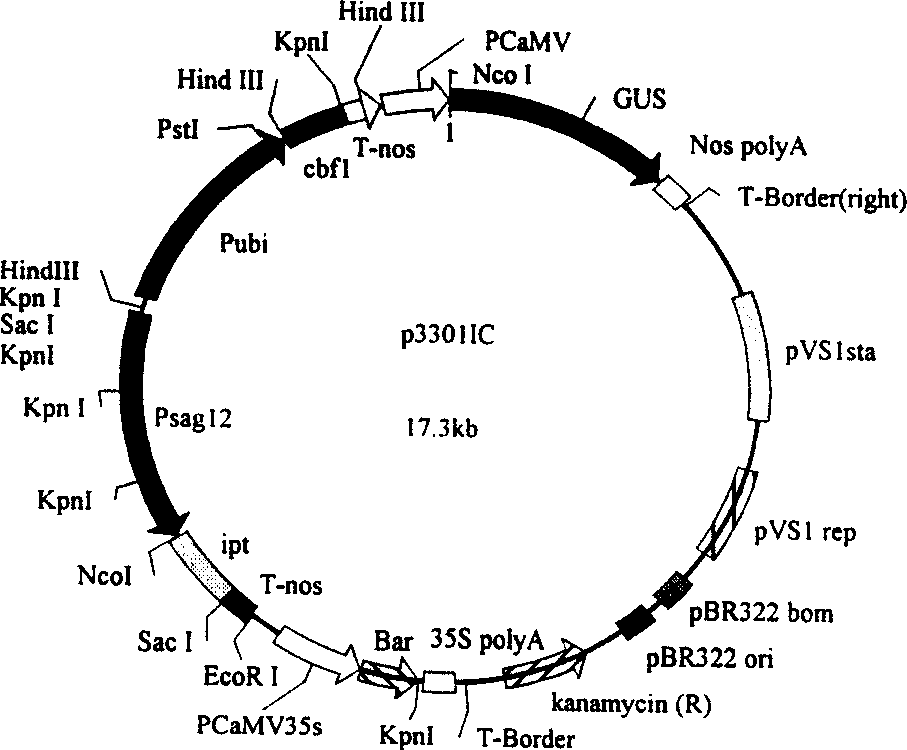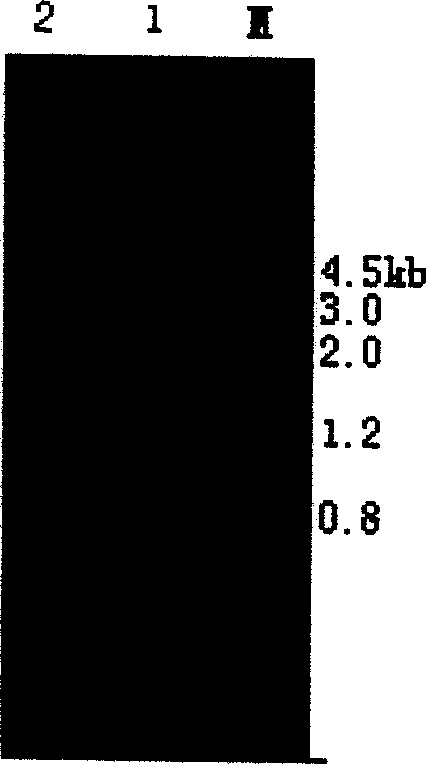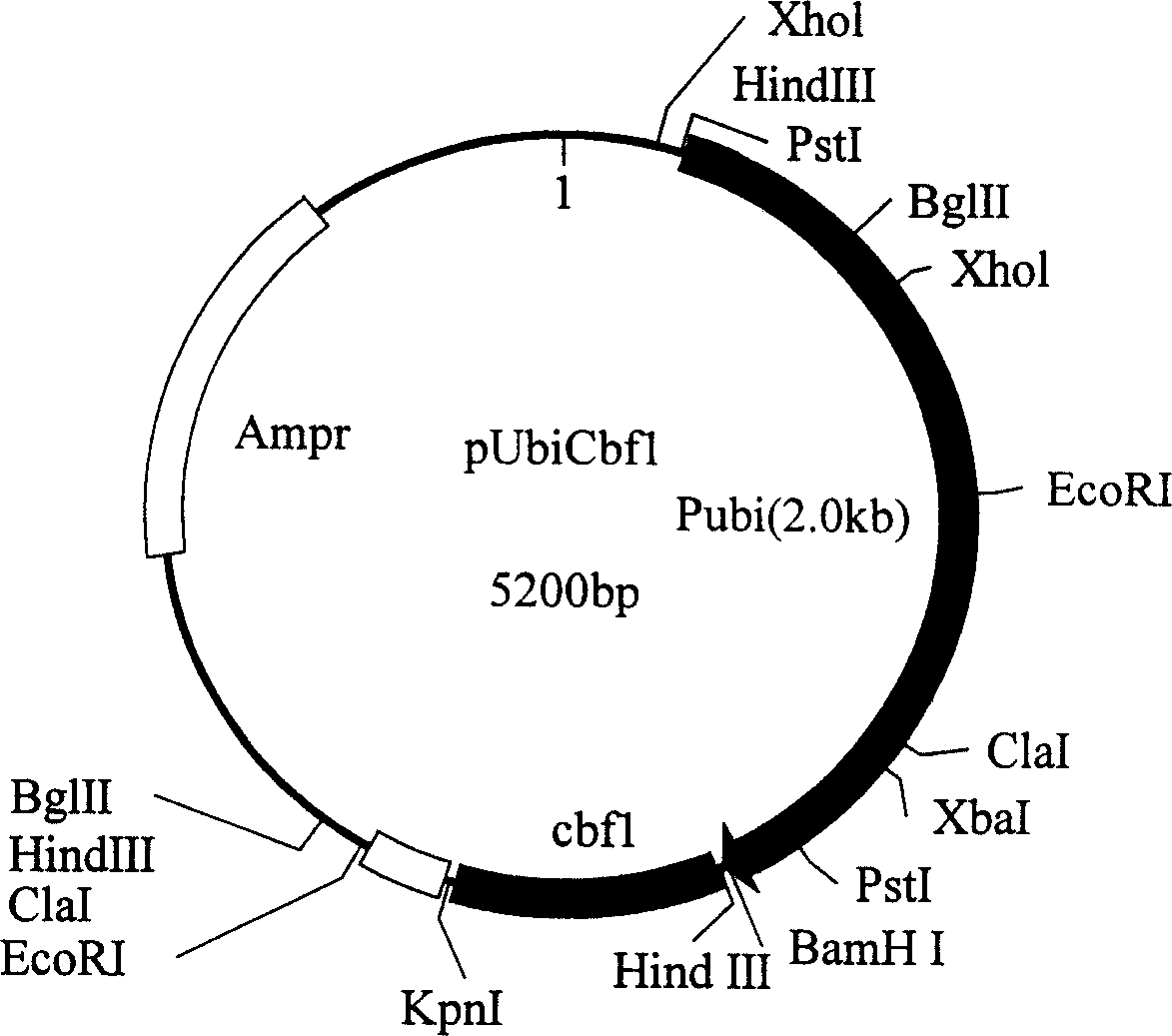Plant bivalent anti-reverse gene bielement expression carrier
A binary expression vector and gene technology, applied in the direction of using vectors to introduce foreign genetic material, DNA/RNA fragments, recombinant DNA technology, etc., can solve the problems of difficulty in obtaining stable transgenic strains, increased independent genetic probability, etc., to achieve enhanced resistance Anti-aging, simple construction steps, anti-aging effect
- Summary
- Abstract
- Description
- Claims
- Application Information
AI Technical Summary
Problems solved by technology
Method used
Image
Examples
Embodiment 1
[0034] Example 1 Construction of the vector p3301-Nos
[0035] 1. Experimental materials and kits
[0036] The restriction endonuclease and ligase kits used were all produced by NEB Company, and the DNA fragments were recovered using the column centrifugation kit produced by Tsinghua Tianwei Times Company. E. coli competent cells were purchased from Tsinghua Tianwei Times Company. Plasmid extraction was performed with a kit produced by Tsinghua Tianwei Times Company, and all operating procedures were carried out according to the kit instructions.
[0037] 2. Experimental content
[0038] The intermediate vector pSAGI was digested with EcoRI and SacI, and the 0.3kb T-Nos fragment was recovered. At the same time, the binary vector p3301 was digested with EcoRI and SacI, and the 11.3kb fragment was recovered as a vector. T4-DNA ligase was used to connect the corresponding positions of the two fragments. On the spot, the vector p3301-nos was obtained, and the 5' end of the newl...
Embodiment 2
[0070] Example 2 Construction of vector p3301C-nos
[0071] The reagent equipment and experimental steps are the same as in Example 1, and the experimental contents are as follows:
[0072]The cloning vector pUBC was digested with endonuclease HindIII, and the fusion gene Pubi-cbf1 fragment of about 3 kb was recovered. At the same time, the vector p3301-nos was digested with endonuclease HindIII, and the 11.6kb fragment was recovered as a vector, and the fusion gene Pubi-cbf1 was connected to At the HindIII site of p3301-nos, the vector p3301C-nos was obtained, in which the fusion gene Pubi-cbf1 was in a clockwise direction, and the 5' end of the newly inserted T-nos on p3301C-nos had a SacI single enzyme cleavage site. see Figure 5 , 6.
[0073] The reaction system is HindIII single enzyme system:
[0074] Plasmid 5μl (about 1μg)
[0075] 10×buffer2 0.5μl
[0076] HindIII 0.5μl (about 5 units)
[0077] ddH 2 O 44μl
[0078] Total 50μl
Embodiment 3
[0079] Example 3 Construction of bivalent binary vector p3301IC
[0080] The reagent equipment and experimental steps are the same as in Example 1, and the experimental contents are as follows:
[0081] The intermediate cloning vector pSAGI was digested with endonuclease Sac I, and the fusion gene Psag without T-nos of about 2.7kb was recovered 12 -ipt fragment, digest the vector p3301C-nos with endonuclease SacI at the same time, recover the large fragment in the digested product as a vector, and use the fusion gene Psag without T-nos 12 -The ipt fragment was inserted into the SacI site of p3301C-nos in the forward direction to obtain the bivalent binary vector p3301IC. see Figure 7 ,2.
[0082] The reaction system is Sac I single enzyme digestion system:
[0083] Plasmid 5μl (about 1μg)
[0084] 10×buffer1 0.5μl
[0085] SacI 0.5μl (about 5 units)
[0086] 10×BSA 0.5μl
[0087] ddH 2 O 43.5μl
[0088] Total 50μl
PUM
 Login to View More
Login to View More Abstract
Description
Claims
Application Information
 Login to View More
Login to View More - R&D
- Intellectual Property
- Life Sciences
- Materials
- Tech Scout
- Unparalleled Data Quality
- Higher Quality Content
- 60% Fewer Hallucinations
Browse by: Latest US Patents, China's latest patents, Technical Efficacy Thesaurus, Application Domain, Technology Topic, Popular Technical Reports.
© 2025 PatSnap. All rights reserved.Legal|Privacy policy|Modern Slavery Act Transparency Statement|Sitemap|About US| Contact US: help@patsnap.com



